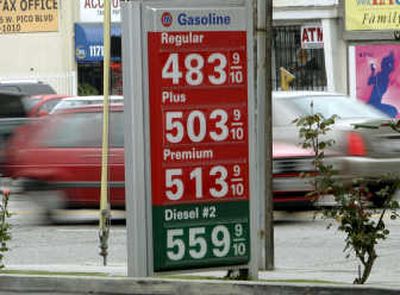Gas prices blamed on speculation

WASHINGTON – One is a billionaire financier and the other operates seven gas stations and convenience stores in a farming community of 7,000 in Eastern Washington.
But George Soros and Gerry Ramm delivered the same message Tuesday to the Senate Commerce Committee: Rampant speculation has helped spur out-of-control crude oil prices.
In the measured tones of high finance, Soros, whose hedge fund by some accounts made $3 billion last year, talked about a “speculative excess” and warned that the run-up in oil prices could drag the United States into a recession.
“There is a strong prima facie case against institutional investors pursuing a commodity index-buying strategy,” he said. “It is intellectually dishonest, potentially destabilizing and distinctly harmful in its economic consequences.”
Ramm, the president of the Inland Oil Co. of Ephrata, Wash., was a bit more plainspoken.
“Excessive speculation on energy trading facilities is the fuel that is driving this runaway train in crude oil prices,” he said.
Others testifying at the hearing said that speculation by investment banks, hedge funds, institutional investors and others may be responsible for more than half of the skyrocketing price of crude oil. The Federal Trade Commission and the Commodity Futures Trading Commission, they said, have failed to investigate.
Sen. Maria Cantwell, D-Wash., and others at the hearing said they welcomed the news last week that the CFTC, for the past six months, has been investigating the trading of contracts for future deliveries of oil, commonly called futures contracts. But they said the investigation was too limited in scope and fell far short of the tougher probes required.
Cantwell, who chaired the hearing, was especially critical of the CFTC for deciding that regulators in London and Dubai should patrol international crude oil markets rather than doing so itself.
The International Petroleum Exchange is in London but is owned by an Atlanta exchange; the oil trading exchange in Dubai is connected with the New York Mercantile Exchange.
In addition, West Texas Intermediate Crude is the benchmark used on most international oil markets.
Cantwell said the CFTC had oversight authority over international exchanges but so far had refused to act. Speculators are taking advantage of the situation, she said.
“This is no different than when U.S. businesses take out a post office box in the Cayman Islands to avoid U.S. business laws,” Cantwell said. The commission, so far, has proved to be a “toothless tiger” which has “abdicated its oversight responsibility,” she said.
Sen. Byron Dorgan, D-N.D., said he thought there had been an “orgy” of speculation when it came to the oil markets.
“The law of bubbles is that all bubbles burst,” Dorgan said.
Even as speculators and others are getting rich, the retail side of the industry is getting squeezed, Ramm said.
“Last year, gasoline dealers and heating oil retailers saw profit margins from fuel sales fall to their lowest point in decades as oil prices surged,” he said, adding that most station owners make their profits by selling drinks and snacks.
Ramm, representing the Petroleum Marketers of America, said retailers were near the limits on their lines of credit because of the high petroleum prices.
“This creates a credit crisis with marketers’ banks, which creates liquidity problems and may force petroleum marketers and station owners to close up shop,” he said.